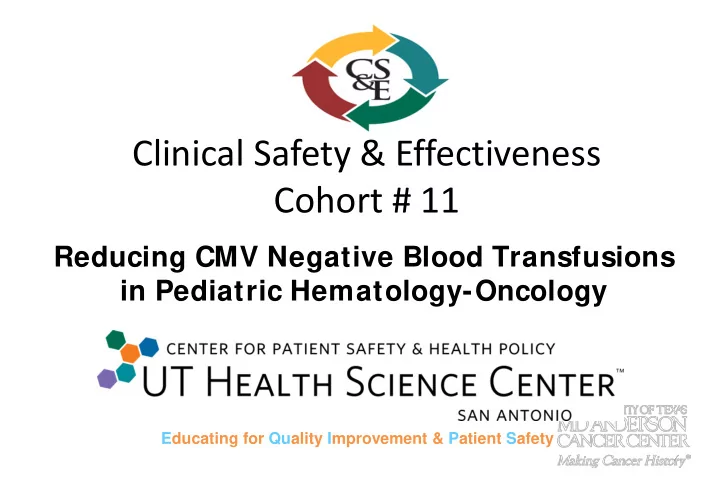

Clinical Safety & Effectiveness Cohort # 11 Reducing CMV Negative Blood Transfusions in Pediatric Hematology-Oncology DATE Educating for Quality Improvement & Patient Safety 1
Financial Disclosures • Team members have no conflicts of interest to report. 2
The Team • Division – *Melissa Frei-Jones, MD MSCI (PDHO Faculty) – *Aaron Sugalski, DO (PDHO Faculty) – Bradley Scoggins, MD (PGY-2, Pediatrics) – Leopoldo Cobos (Transfusion Services Supervisor) • Sponsor Department – Pediatrics *CS&E Particpants 3
What We Are Trying to Accomplish? OUR AIM STATEMENT We propose to decrease by 50% the number of un- necessary CMV negative red blood cell transfusions in pediatric hematology-oncology (PDHO) patients at the Children’s Hospital of San Antonio over 90 days. 4
Project Milestones • Team Created February 2012 • AIM statement created March 2012 • Bi-Monthly Team Meetings March 2012 • Background Data, Brainstorm Sessions, June 2012 Workflow and Fishbone Analyses • Interventions Implemented June 2012 • Data Analysis January 2012 - Ongoing • CS&E Presentation Sept. 14, 2012 5
Transfusion Associated CMV Infection • Children with cancer require red cell transfusions to treat chemotherapy induced anemia. • Transfusion associated-CMV (TA-CMV) increases mortality. – TA-CMV rates of 30-60% in Hematopoietic Stem Cell Transplant (HSCT) with non-tested, non-leukoreduced blood products 1 . – Leukoreduction decreased TA-CMV to 2.5% 2 . – Using CMV negative donors and leukoreduction, TA-CMV rate decreased to 1.5% 2 . References: 1 Hannon J, Hume H. CMV seronegative, irradiated and washed blood components. In: Clinical guide to transfusion. Toronto: Canadian Blood Services; 2006. p 146-153. 2 Nichols WB, Price TH, Gooley T, et al. Transfusion-transmitted cytomegalovirus after receipt of leukoreduced blood products. Blood 6 2003;101:4195-4200.
CMV Negative Blood Is Rare. • 30-80% of blood donors are CMV sero-positive 1 . – CMV survives in circulating white blood cells in CMV positive blood donors 3 . • Leukoreduction reduces risk of TA-CMV. – Each unit of red cells = 2-5 X10 9 White Blood Cells (WBC) – Third generation leukocyte filters decrease below 1-5 X10 6 WBC References: 1 Hannon J, Hume H. CMV seronegative, irradiated and washed blood components. In: Clinical guide to transfusion. Toronto: Canadian Blood Services; 2006. p 146-153. 3 Ljungman P. Risk of cytomegalovirus transmission by blood products to immunocompromised patients and means for reduction. Br J Haematol 2004;125:107-116. 7
Current Recommendations • CMV sero-negative oncology patients who are candidates for HSCT should receive CMV negative blood products. • CMV negative blood products should be reserved for CMV sero-negative patients. 8
Pedi Heme-Onc Ordering Practices High rate of un-necessary CMV negative blood products. • Review of 41 patients with CMV • 66% (27/41) did not require negative orders CMV negative products but received them anyways. – 14 patients CMV sero-negative – 13 patients had CMV positive • CMV negative product order serology rate should be 30%. – 14 patients were untested b/c they did not need CMV negative products 9
Process Flow Chart Pt identified needing blood transfusion Inpatient Standardized Blood Bank Orders Order Entry Receives Order MD/PNP Order (MA or RN) (Electronic) for Transfusion Outpatient Handwritten Nurse Collect Type Order and Cross Patient Receives Blood Band Blood Bank Blood Bank Receives Type Identifies Unit and Cross Patient Receives Two Nurses Verify Red Cell Blood Unit Transfusion
Fishbone 11
Intervention • Education • Blood Bank – Faculty & PNP – Review and correct labels for existing patients • Create and disseminate decision tree. – Revise Order Process for Old – Resident Inpatient School Patients • Discuss CMV Decision Tree • Question any CMV order if and standardized transfusion varies from known status orders. – Create Order Process for – Nursing staff New Patients • Reviewed decision tree • CMV status reviewed by MD • Transfusion labels on patient and included in pt record charts. 12
Decision Tree 13
Implementing the Change • April 26, 2012 - Faculty Create CMV Decision Tree • May, 2012 – Transfusion Labels • May 8, 2012 – Updated CMV status with Blood Bank • June, 2012 – Nursing Meeting • August 9, 2012 – Housestaff Inpatient School 14
Results/Impact PDHO Transfusions 60 50 40 # of Transfusions Ttl Trans 30 CMV Neg CMV Safe 20 10 0 Jan Feb Mar Apr May Jun July Aug Housestaff CMV Decision Blood 15 Tool Bank
Expansion of Our Implementation • Type of Blood Product – Platelets • Other medical and surgical services • Integrate into housestaff curriculum • CPOE – Standardized order sets created to be implemented with CPOE hospital wide. 16
Return on Investment • South Texas Blood and Tissue Charge to Hospital for CMV neg blood = $36/unit • Annual cost prior to intervention = $17,280 – 80% of units ordered CMV negative • Annual cost after intervention = $8,640 – 40% of units ordered CMV negative • Annual Savings = $8,640 17
Conclusion/What’s Next • Through simple, inexpensive measures, we successfully reduced un-necessary CMV negative blood product ordering in Pedi Heme-Onc patients. • In the future, we will disseminate CMV Decision Tree to other pediatric services in our hospital. • Long-term Goal – Integrate into CPOE 18
Howard A. Britton Children’s Cancer and Blood Disorders Center Thank you! Educating for Quality Improvement & Patient Safety 19
Recommend
More recommend